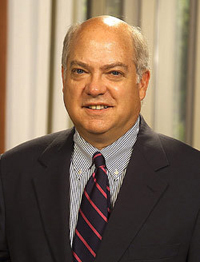
The first rule of crisis communication management is for the company to get the facts fast so that it is dealing from an informed position and becomes the source of reliable information, says business communications expert James S. O’Rourke IV of the University of Notre Dame.
According to O’Rourke, BP bungled this rule in the early days of the Gulf oil crisis, and now faces a critical loss of credibility that has long-term consequences.
But there are still some measures the oil company can take to repair its image.
“Once the Deepwater Horizon caught fire and sank, BP should have put a person in charge of the crisis, given that person resources and let the public know who the person is,” says O’Rourke, who is the director of the Fanning Center for Business Communication at Notre Dame’s Mendoza College of Business. “That’s where they didn’t get out of the blocks fast enough. And now people consider Thad Allen as the spokesman for the disaster. BP has surrendered its authority as a $237-billion oil giant to a Coast Guard admiral.”
O’Rourke, who has an extensive background in corporate communications and is writing a book about how a company should handle crisis situations, outlines several fundamental errors in BP’s crisis communications strategy. Besides being late in releasing facts about the disaster, the company did not – and still hasn’t – clearly determined the real problem, including the magnitude of the spill and short- and long-term consequences. This knowledge gap has allowed others to enter their voices into the debate as experts, essentially vacating BP’s credibility.
“And without credibility, a company loses legitimacy. Without legitimacy, it loses authority. Without authority, the problem becomes no longer the company’s to solve. Someone else will take over,” O’Rourke says.
Compounding BP’s muddled responses were some significant public gaffes on the part of BP’s CEO.
“Tony Hayward has been featured in TV interviews saying he wants his life back,” O’Rourke says. “He has seriously underestimated the social and economic costs – and has made a lot of enemies.”
Despite recent TV spots featuring Hayward addressing the crisis, the CEO’s message still tends to sound too much like an executive focused on profits, and not enough like a petroleum engineer who can talk to people in the Gulf area about remediating damages, he adds.
“It’s tough for paid ads to compete with the daily media reports showing oil-covered wildlife, tar balls on beaches and docked fishing boats,” O’Rourke says. “But there are other consequences that give good reason for BP to repair its image. With the company’s stock down about 40 percent from its 52-week high-mark of $62 per share, investors stand to suffer significant long-term loss if the company doesn’t recover. Further, an estimated 70 percent of all British pensioners have BP stock in their portfolios. BP also may find it more difficult to obtain drilling permits in the future, and to form the partnerships with outside companies necessary for deep-water drilling.
“For these reasons, it is crucial that BP mount a significant crisis communications effort to repair its image,” says O’Rourke. “One of its next moves should be to appoint a company executive to be in charge of the communications effort – and that person should not be the CEO. He or she should be given authority and resources to solve the problem, and be clearly identified as the spokesperson to the public. The crisis point-person and team should be isolated from other day-to-day operational concerns so they can focus on the just the crisis.
“The team needs to develop a strategy for solving the problem and dealing with affected parties. Part of the strategy should be defining goals for the near-term, midterm and long-term, as well as measuring efforts toward those goals.
“Above all, a company facing a crisis needs to be as transparent as possible in its communications. In the end, you want to be able to say, ‘It took us awhile to get this done, but we told you the truth the whole way. Events have taken a tragic turn, but we can make this right,’” says O’Rourke.
Media advisory: Professor O’Rourke’s comments may be used in whole or in part. He is available for interviews and can be reached at 574-631-8397 or James.S.ORourke.2@nd.edu